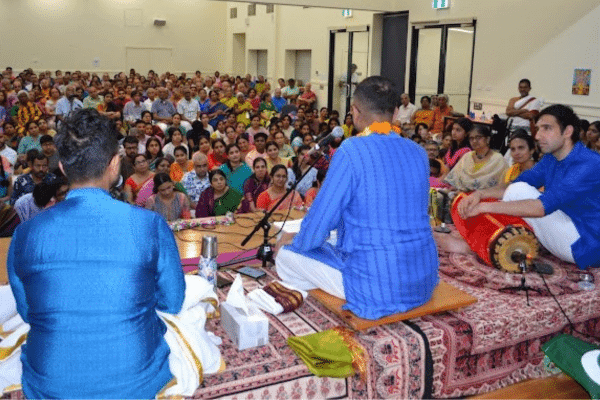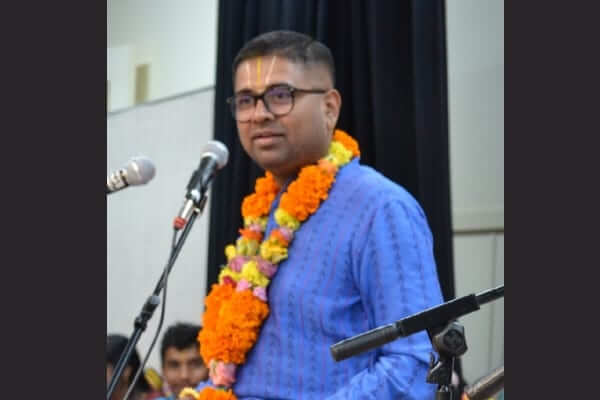Dushyanth Sridhar is now a familiar figure in India, much sought after to throw light on all matters Santana dharma. On his Australia-New Zealand tour this month, the Vedic Society of Victoria organised a week-long pravachan by this eminent scholar between 5 and 11 March.
Being the first face-to-face pravachan organised since COVID, so many astikas flocked to the venue (Scholastica Centre) to hear him that organisers had their hands full trying to accommodate them all. There was standing room only, and since the lectures were in English, they attracted a good cross section of the Indian community. For seven days, the devotees thronged the venue long before the start time to be able to find a seat.
This was a saptaham devoted to the Bhagwata Purana, the most sacrosanct of the 18 Puranas as it chronicles the avataras of Vishnu. The holiest is the Dashama Skanda which describes Krishna’s birth and leelas or pastimes. The devotees were in thrall to Sri Sridhar, hanging on his every word as he brought to life the avatars of Lord Vishnu, the birth of Lord Krishna, and His wedding with Rukmini.
I caught up with Sri Sridhar for a brief chat. Here are some excerpts.
Thank you for a blissful Bhakti-soaked week of Bhagawatam! When did you become interested in our scriptures, Itihasas and Puranas?
Dushyanth Sridhar: I have always been interested in our religious traditions –from the age of around five. I remember listening to the cassette tapes of such stalwarts as Anantarama Dikshitar, Mukkur Lakshmi Marasimhachary, Balakrishna Shastrigal, Sivananda Vijayalakshmi, Pulavar Keeran et al, which my grandparents would play regularly. I used to be enthralled by their narration. I realised I was drawn towards storytelling. In Sanatana Dharma, all the wonderful stories are recorded events which were presented in the form of poetry through various works, but were still our history – recorded history. I was deeply interested in them, and began learning the shastras under various teachers. Later, while studying in BITS Pilani, then a village in Rajasthan, our vice chancellor encouraged me to deliver upanyasams. It soon became a passion; I had no idea it would become my life.
When did you learn Samskritam and become so proficient in it?
Dushyanth Sridhar: I am no Samskritam scholar. I don’t say this out of modesty or humility. Most of our scriptures are in this ancient language – Ramayana, Mahabharata, the Puranas, the works of the great acharyas. That said, most people ‘know’ Samskritam through shlokas they learn. So even though they haven’t learnt the language as such, they are familiar with many words in Samskritam. So with a little practice, one can catch the rough and raw meaning of a shloka when one hears it. Later, I learnt the Vedanta, Gita Bhashyam and Sribhashyam under my Acharyas – all these works as you know are in Samskritam. Through them, I began understanding the language more. I then completed a correspondence course in Samskritam; however, I would say I’m still at a beginner’s level. Samskritam is an ocean, a very intricate language – to the extent that I can understand the shlokas and explain them to the public, I have some proficiency.

We are now at a time in history when there is greater awareness of, and pride in, Sanatana Dharma. How does one promote this without pandering to hindutva at the same time?
Dushyanth Sridhar: Sanatana Dharma, Hinduism as a religion, had been practised across the subcontinent to Myanmar, Southeast Asia and parts of Central Asia historically. However, between the ninth and seventeenth centuries, India was marked by invasions of various kinds. Many historians simply don’t acknowledge that Bharata was under siege on account of successive invasions. The Hindu was made to feel apologetic for adhering to Sanatana Dharma. European colonists too made us feel that everything European was hunky dory, while everything to do with Sanatana Dharma was uncivilised!
This was Edward Said’s idea of Orientalism….
Dushyanth Sridhar: True. Despite Independence, we just carried on with the Western agenda. As a speaker, I don’t have a problem with any religion – or the followers of any religion. I believe every religion must be given the space to thrive. However, I have a problem when one religion says they are the best and theirs is the only way, or that people of other religions are bad. This exclusivist approach is what will cause disharmony in society. Thankfully due to social media where people can put documents out there for everyone to see – a vast majority have begun to understand how history had been misrepresented and misinterpreted in India, and are going back to their roots. My belief is that my civilisation wasn’t bad at all. There may have been some flaws – but we are ready to course-correct. If people see this as aligning with a political ideology, it’s their choice. That’s not how I flag it.
What project or passion are you working on at the moment?
Dushyanth Sridhar: I am writing a two-part series on the Ramayana for Harper Collins. The first part is slated for release in 2024, and the second towards end-2025. Hopefully it will attract readers from the age of 10 to a hundred, and take them on the journey that Valmiki wanted to. Not that it has not been done before – stalwarts such as Rajaji, Kamala Subramanyam and R K Narayan have rendered abridged versions of Ramayana in English. Others have attempted to present the Ramayana in their own way. My aim is to present the Ramayana to readers across the age spectrum, which is at the same time true to the original and examines the commentaries on the epic – while presenting them in such a way that it does not feel like a research thesis, but an interesting read. The inauguration of the Rama temple in Ayodhya has rekindled the Ramayana fervour and I thought a book on that epic would be apt.
READ ALSO: The Vishnu Puranas by McComas Taylor




